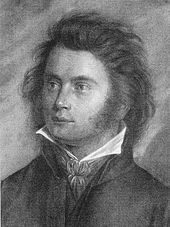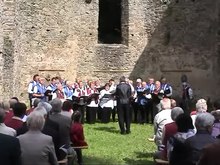Friedrich Theodor Fröhlich
Friedrich Theodor Fröhlich (born February 20, 1803 in Brugg , Canton Aargau, Switzerland; † October 16, 1836 in Aarau , Canton Aargau, Switzerland) was a Swiss composer . He is considered the most important composer of the early Romantic period in Switzerland.
biography
Friedrich Theodor Fröhlich was born as the sixth child of his parents. His father was Emanuel Froelich (1769–1848), teacher, justice of the peace and city councilor in Brugg, his mother Rosina Froelich Märki (1766–1893). His eldest brother was the pastor, writer and politician Abraham Emanuel Fröhlich . Friedrich Theodor Fröhlich attended the «Collegium Humanitatis» high school in Zurich from 1820 to 1822, and then, following his father's wish, began studying law in Basel. After a year he moved to Berlin.
After dropping out of his studies due to illness, Fröhlich returned to Switzerland in 1824. He now took composition lessons with Michael Traugott Pfeiffer in Aarau. A scholarship from the Aargau cantonal government enabled him to study music in Berlin with Karl Friedrich Zelter and Bernhard Klein from 1826 to 1828 , where he also met Felix Mendelssohn Bartholdy . After the scholarship years, Fröhlich stayed two years as a freelance musician in Berlin before returning to Aarau in Switzerland in 1830. Some of his works that were positively recognized in German music magazines were published in Berlin.
In Switzerland, Fröhlich made his way through private lessons and as a part-time teacher at public schools - the Aarau Cantonal School and, from 1833, also the Aarau City Schools - and as leader of choirs and an orchestra of lovers. He devoted the few free hours to composing. Liturgical works such as his Passion cantata and a Christmas cantata were created here , alongside teaching works (50 children's songs), choral works and piano songs. In 1832 Fröhlich married Ida von Klitzing (1805-1859), whom he had met during his stay in Berlin. They had two daughters who reached adulthood.
In Aarau, Fröhlich had to struggle with a lack of recognition and support for his art, with constant financial problems and finally with difficulties in marriage. An increase in this burden led him to end his life on October 16, 1836 by jumping into the Aare . He left over 700 compositions, including more than 300 choral works and over 300 piano songs. Very few of these works have been printed to date. Most of the musical legacy is kept as manuscripts in the manuscript department of the University Library of Basel . Recently there has been a growing interest in this musical legacy. In 2017 the "International Friedrich Theodor Fröhlich Society" was founded in Brugg , the city of Fröhlich's birth . Together with the “Fröhlich-Concerts Brugg” cultural association, which was founded there at the same time, it supports the publication and public performance of these works.
Fröhlich's music is characterized by refreshing and natural melodicity and a sense for the simple and at the same time effective. It is rich in emotional expression and in unexpected twists and turns in the area of harmony. However, rigid formulas and diagrams can often also be found in his works.
Until a few years ago, Fröhlich's copy and adaptation of a mass by Johann Gottlieb Naumann (1741–1801) was mistakenly viewed as his own composition and performed as such ( Missa 1 ), although the manuscript was not signed by him. Fröhlich was acquainted with Naumann's widow in Berlin, who campaigned for the performance of her deceased husband's works.
Works (selection)
Theodor Fröhlich's work includes orchestral works , chamber and piano music as well as various vocal works. There is a detailed catalog of works.
Orchestral works
- Overture to Dyhrn's Konradin (1827)
- Symphony in A major (1828), 3 movements (probably unfinished)
- Overture in B flat major (1832)
- Overture to Passion Music in F minor (1835)
Chamber music
- Pastorale and Rondo for oboe and piano (1824)
- Three sonatas for violin and piano (1826)
- Four string quartets (1826–32)
- Sonata for violoncello and piano in F minor (1830)
- Quintet for piano, 2 cellos and 2 horns (1833)
- Quartet for piano, violin, viola and violoncello (1835)
- Fantasy for violin and piano (1832)
- Fugue for string quartet (1828)
Piano music
- Sonata in A major, op.11 (1831)
- Six elegies, op.15 (1833)
- Waltz and landlord
- 4-hand piano pieces
Vocal music
- Jesus, the child friend ; Cantata (1834)
- The 137th Psalm (1827)
- Canticum Simeonis (December 24, 1829)
- Funeral ceremony (1829)
- Stabat mater (German) (1829)
- Christmas Cantata (1830)
- Song of the spirits over the waters ( Goethe ) (1831)
- Calm sea and happy voyage ( Goethe ) (1831)
- Passion Cantata (1831)
- Our Father (1832)
- Litany (1832)
- Whom God Wills Show Right Favor (1833)
- Price of love (1834)
- 2nd Mass (1835)
- 1st psalm (1836)
- Domine, Jesus Christe (1836)
- Numerous other works and songs for male, female and children's choirs
Discography (selection)
- CDs
- Romantic songs. Susanne Oldani (soprano), Tino Brütsch (tenor), Rudolf Remund (baritone), Peter Sterki (piano). 2008.
- Christmas Mass (Missa I, 1828); Passion Music Overture in F minor; Andante and minuet; Concert overtures in B flat major. Choir of the Old Cantonal School Aarau , Thomas Baldinger (cond.); Aargau vocal soloists; Aargau Symphony Orchestra ; Lisa Larsson (soprano), Regina Jakobi (alto), René Koch (bass-baritone), Bernhard Gärtner (tenor); Karl-Andreas Kolly (piano), Räto Tschupp (cond.)
- Mass for solos, choir and orchestra No. 1; Offertory Parvulus natus est nobis ; Soloists: Simone Kohler, Christina Aeschbach, Walter Meier, Michael Pavlù; Collegium musicum and Lucerne Music Academy; Head of Alois Koch; Performance of the Jesuit Church Lucerne, December 9, 1990, audio document in: Swiss National Sound Archives Lugano (BSFILE9249) https://www.fonoteca.ch/cgi-bin/oecgi4.exe/inet_fnbasedetail?REC_ID=9249.046&LNG_ID=DEU .
- Four motets for 4-part mixed choir ; 12-part Miserere with piano accompaniment. Basel vocal soloists; Mikayel Balyan (fortepiano), Sebastian Goll (cond.). Federation of Migros Cooperatives , Zurich 2006. ( Musiques suisses series . )
- Missa brevis - The first psalm. Anniversary concert. Orchesterverein Ostermundigen, Singkreis Ittigen [et al.]; Head: Alexandru Ianos. Eagle records, 2003.
- Romantic Switzerland. The image of Switzerland in romantic music. Christa Goetze (soprano), Liliane Zürcher (mezzo-soprano), Jutta Pulcini (flute), Felicitas Strack (piano). Swiss Music Scene Series .
- Fröhlich / Goetz / Huber: song quartets. Barbara Fuchs (soprano), Anna Schaffner (alto), Bernhard Hunziker (tenor), Fabrice Raviola (baritone), Hartwig Joerges and Georges Starobinski (piano), Andras Müller-Crepon (speaker); Zurich vocal quartet. Series Music Scene Switzerland ., 2000
- Six elegies for piano op. 15 (1833); Pastorale and Rondo for oboe and piano (1824); Sonata for violoncello and piano in F minor (1830). Omar Zoboli (oboe), Lubimov Monighetti (fortepiano), Jean-Jacques Dünki (piano). 1994.
literature
- Moritz Fürstenau: Happy, Theodor . In: Allgemeine Deutsche Biographie (ADB). Volume 8, Duncker & Humblot, Leipzig 1878, p. 134.
- Heinrich Nidecker: Theodor Fröhlich and his Thurgau acquaintances. In: Thurgauer Jahrbuch , Vol. 32, 1957, pp. 101–118. ( Digitized version )
- Edgar Refardt : Theodor Fröhlich, a Swiss romantic musician. Amerbach-Verlag, Basel 1947.
- Pierre Sarbach: Friedrich Theodor Fröhlich. Winterthur 1984.
- Hans Peter Schanzlin: Fröhlich, Friedrich Theodor. In: New German Biography (NDB). Volume 5, Duncker & Humblot, Berlin 1961, ISBN 3-428-00186-9 , p. 647 f. ( Digitized version ).
- Michael Schneider : Happy, (Friedrich) Theodor. In: Ludwig Finscher (Hrsg.): The music in past and present (MGG). 2nd edition, Person Teil, Volume 7, Kassel Basel 2002, pp. 193–195.
Web links
- Literature by and about Friedrich Theodor Fröhlich in the catalog of the German National Library
- Friedrich Theodor Fröhlich's estate in the Basel University Library
- Pierre Sarbach: Fröhlich, Friedrich Theodor. In: Historical Lexicon of Switzerland .
- Sheet music and audio files by Friedrich Theodor Fröhlich in the International Music Score Library Project
- Sound documents by and about Friedrich Theodor Fröhlich in the catalog of the Swiss National Sound Archives
- Autograph of the Six Elegies op. 15 , Basel University Library
- International Friedrich Theodor Fröhlich Society
Individual evidence
- ↑ See e.g. Edgar Refardt, in: Theodor Fröhlich. A Swiss romantic musician. Basel (1947) and Pierre Sarbach, in: Brugg. Festschrift on the occasion of the anniversary celebrations for 700 years of Brugg town rights. Brugg (1980) p. 68. Recently, Fröhlich has even been seen as the most important Swiss romantic musician. See e.g. B. Heinz Holliger , Interview in the newspaper Nordwestschweiz (May 10, 2016) and Walter Labhart, New View on Friedrich Theodor Fröhlich. In: General-Anzeiger, Brugg (April 18, 2019)
- ↑ See e.g. E.g. Allgemeine Musikalische Zeitung, Leipzig, 32 (1830) 722 and 822, Berliner Allgemeine Musikalische Zeitung, 7 (1830) p. 408, Berliner Musikalische Zeitung (1933) p. 18 and 369.
- ↑ z. E.g. Thomas Meyer: Johann Gottlieb Naumann and Friedrich Theodor Fröhlich. In: Schweizer Musikzeitung, 5, (2002) p. 9.
- ↑ Catalog raisonné
| personal data | |
|---|---|
| SURNAME | Happy, Friedrich Theodor |
| BRIEF DESCRIPTION | Swiss composer |
| DATE OF BIRTH | February 20, 1803 |
| PLACE OF BIRTH | Brugg |
| DATE OF DEATH | October 16, 1836 |
| Place of death | Aarau |

